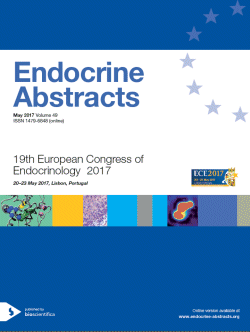
19th European Congress of Endocrinology
Lisbon,
Portugal
20 May 2017 - 23 May 2017
Oral Communications
Cardiovascular endocrinology (1)
ea0049oc7.1 | Cardiovascular endocrinology (1) | ECE2017
Estrogens enhance gonadectomy-induced adrenocortical tumor progression in mice
Chrusciel Marcin , Doroszko Milena , Jakobi Meike , Brouze Michal , Ponikwicka-Tyszko Donata , Bernaczyk Piotr , Anisimowicz Slawomir , Wolczynski Slawomir , Toppari Jorma , Huhtaniemi Ilpo , Rahman Nafis
ea0049oc7.2 | Cardiovascular endocrinology (1) | ECE2017
Targeted molecular markers derived from genomic classification for adrenocortical cancer prognostication
Jouinot Anne , Assie Guillaume , Fassnacht Martin , Libe Rossella , Dousset Bertrand , Ronchi Silviu Sbiera Cristina , Kroiss Matthias , Korpershoek Esther , De Krijger Ronald , Waldmann Jens , Quinkler Marcus , Tabarin Antoine , Chabre Olivier , Luconi Michaela , Mannelli Massimo , Groussin Lionel , Baudin Eric , Amar Laurence , Beuschlein Felix , Bertherat Jerome
ea0049oc7.3 | Cardiovascular endocrinology (1) | ECE2017
High Total 68Ga-DOTATATE-Avid Tumor Volume (TV) is associated with low progression-free survival and high disease-specific mortality rate in patients with neuroendocrine tumors
Tirosh Amit , Papadakis Georgios Z. , Millo Corina , Sadowski Samira M. , Herscovitch Peter , Pacak Karel , Marx Stephen J. , Yang Lily , Nockel Pavel , Shell Jasmine , Green Patience , Keutgen Xavier M. , Patel Dhaval , Nilubol Naris , Kebebew Electron
ea0049oc7.4 | Cardiovascular endocrinology (1) | ECE2017
A novel insight into the anticancer mechanism of metformin in Pancreatic Neuroendocrine Tumor cells
Vitali Eleonora , Piccinini Sara , Boemi Ilena , Tresoldi Alberto , Zerbi Alessandro , Carnaghi Carlo , Spada Anna , Lania Andrea
ea0049oc7.5 | Cardiovascular endocrinology (1) | ECE2017
Regulation of steroid receptor signalling by tumor suppressor INPP4B
Zhang Manqi , Suarez Egla , Nathanson Lubov , Ittmann Michael , Weigel Nancy , Agoulnik Irina



